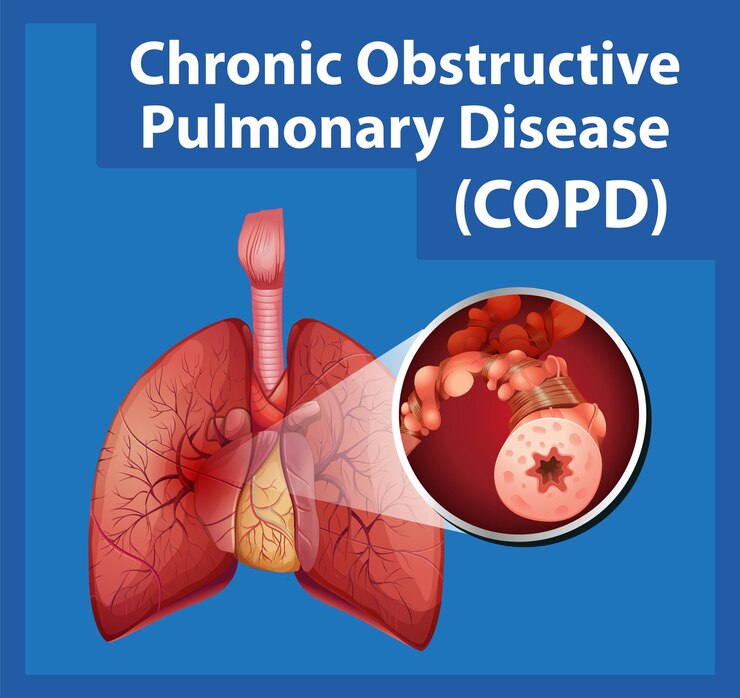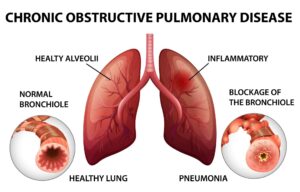Last updated on July 14th, 2025 at 11:20 am

COPD treatment encompasses a range of strategies aimed at managing the symptoms, slowing disease progression, and improving the overall quality of life for individuals living with COPD. COPD is a chronic lung condition that includes conditions like chronic bronchitis and emphysema, which are characterized by persistent airflow limitation and symptoms such as breathlessness, chronic cough, and excessive mucus production.
While COPD is not currently curable, appropriate treatment can help individuals effectively manage the disease. COPD is characterized by symptoms such as breathlessness, chronic cough, and excessive production of mucus. Though it can significantly impact the quality of life, with proper Chronic Obstructive Pulmonary Disease treatment (COPD) and lifestyle changes, individuals can manage the condition effectively.
The primary causes of COPD are long-term exposure to tobacco smoke, environmental pollutants (such as air pollution and workplace dust), and genetic factors.
COPD Treatment
The best treatments for COPD are as follows:
1. COPD Treatment Medications
Short-acting bronchodilators: These are used on an as-needed basis to provide quick relief from symptoms. Examples include albuterol (Proventil, Ventolin) and ipratropium (Atrovent).
Long-acting bronchodilators: These are taken regularly to keep the airways open over a longer duration. Common long-acting bronchodilators include tiotropium (Spiriva), formoterol (Foradil), and salmeterol (Serevent).
Inhaled Corticosteroids: These are used to reduce airway inflammation and are often combined with long-acting bronchodilators in one inhaler. Certainly, here’s a unique version of the information: Examples of combination medications used to treat respiratory conditions include fluticasone/salmeterol (commonly known as Advair) and budesonide/formoterol (often prescribed as Symbicort).
Combination Medications: Some COPD patients may require both bronchodilators and corticosteroids to control their symptoms. Combination inhalers are available, which contain both types of medication.
When a cough with mucus is part of COPD, Ascoril LS Syrup/Relent Plus Syrup can provide symptomatic relief by loosening phlegm.
2. Oxygen Therapy
In severe cases of COPD, oxygen therapy is essential to provide the body with enough oxygen. Oxygen can be administered through nasal cannulas or face masks. This treatment aims to increase oxygen levels in the blood, improve energy levels, and reduce the strain on the heart.
> Consult a doctor and Order Medicine Online
3. Pulmonary Rehabilitation
Pulmonary rehabilitation programs are designed to help COPD patients improve their lung function, reduce symptoms, and enhance their overall quality of life. These programs typically include exercise routines, education about the disease, breathing techniques, and nutritional guidance.
4. Lifestyle Modifications
Smoking Cessation: Quitting smoking is the most critical step in managing COPD. Smoking cessation can slow the progression of the disease and significantly improve lung function.
Diet: A balanced diet rich in fruits, vegetables, and lean proteins can help maintain a healthy weight and provide essential nutrients for lung health.
Exercise: Regular physical activity can strengthen respiratory muscles, improve lung function, and enhance overall endurance. It can also help in managing weight and reducing the risk of complications.
Avoiding Lung Irritants: Individuals with COPD should avoid exposure to secondhand smoke, air pollutants, and other lung irritants, which can exacerbate symptoms.

5. Vaccinations
COPD patients are at higher risk of respiratory infections. Therefore, they should receive annual flu vaccines and the pneumonia vaccine to reduce the likelihood of infections that can worsen their condition.
6. Medication Management
It is of utmost importance to adhere rigorously to the recommended medication schedule. Keep track of when to take your medications and ensure you have an adequate supply on hand. Discuss any side effects with your healthcare provider promptly.
7. Regular Medical Check-ups
COPD is a progressive disease, and its severity can change over time. Regular check-ups with your healthcare provider can help monitor your condition, adjust treatment plans, and address any emerging issues.
Conclusion:
COPD treatment is multifaceted and requires a combination of medications, lifestyle changes, and support to manage effectively. With the right treatment plan and a commitment to a healthier lifestyle, individuals with COPD can lead fulfilling lives and reduce the impact of this chronic lung condition on their daily activities.
If you or a loved one has COPD, consult with a healthcare provider to create a personalized treatment plan that best suits your needs. Remember that early intervention and proactive management are key to living well with COPD.
Read: What are Generic Medicines?
What is Generic Medicine?
A generic medicine is a medication that contains the same active ingredients as a brand-name drug, with the same safety, quality, and effectiveness. However, it is typically sold under its chemical name, not a brand name, and is often more affordable because generic manufacturers don’t have to spend on research and marketing.
Regulatory authorities ensure that generic drugs meet stringent standards for quality and efficacy, making them a cost-effective and equally reliable option for consumers while promoting competition in the pharmaceutical market.
FAQs for COPD Treatment
Q1. What is COPD treatment?
COPD treatment includes medication, pulmonary rehabilitation, and lifestyle changes. Medications like bronchodilators and inhaled corticosteroids help manage symptoms. Pulmonary rehabilitation focuses on exercise and education, while lifestyle changes such as quitting smoking and avoiding irritants are crucial for COPD management.
Q2. Can COPD be completely cured with treatment?
No, COPD is a chronic condition, and there is no known cure. However, proper treatment can effectively manage symptoms, slow disease progression, and improve the patient’s quality of life.
Q3. What is the best treatment for COPD?
The best treatment for COPD often involves a combination of strategies tailored to the individual’s specific needs. This typically includes bronchodilator medications, inhaled corticosteroids if necessary, pulmonary rehabilitation, oxygen therapy for severe cases, and lifestyle changes such as smoking cessation and regular exercise. A comprehensive approach, guided by a healthcare provider, provides the most effective COPD management.
Q4. Are all COPD treatments medication-based?
No, COPD treatment involves a holistic approach. While medications like bronchodilators and corticosteroids are common, pulmonary rehabilitation, oxygen therapy, lifestyle changes, and vaccinations also play crucial roles in managing COPD.
Related Links: